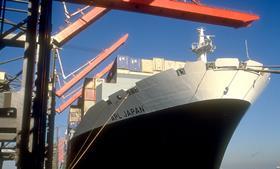
Leading shipping company Neptune Orient Lines (NOL) has announced that it will withdraw a number of its container vessels from service and cut capacity on Asia-Europe routes by 25 per cent following a “challenging” third-quarter 2008.
The announcement came as NOL today (29 October) reported that net profit for the third-quarter 2008 was €28m (US$35m), down 82 per cent on the third quarter of 2007.
Group Earnings Before Interest and Tax (EBIT) for the quarter totalled €41.6m (US$52m) – a fall of 75 per cent from third-quarter 2007 – while third-quarter revenue was up 16 per cent year-on-year to €1.9bn (US$2.4bn).
Announcing the results, NOL group president and chief executive officer Ron Widdows said: “The group continued to generate a profit in the third quarter despite the deterioration of conditions in the container shipping market.”
“Reduced demand in key trade lanes, combined with cost increases and worsening global economic conditions have adversely impacted our profit performance in the third quarter. Against this challenging backdrop, our logistics business delivered satisfactory earnings in third-quarter 2008.”
NOL’s container shipping business, APL, recorded a 10 per cent year-on-year rise in volumes in the third quarter to 622,000 FEU (forty foot equivalent units), driven primarily by the Intra-Asia trade, as well as an increase in Asia-Europe and Transpacific backhaul volumes.
“APL volumes grew on a year-on-year basis, but overall demand in the main trades slowed considerably in the third quarter,” said Mr Widdows.
However, APL’s third quarter EBIT decreased to €7.2m (US$9m), driven largely by lower core freight rates in the Asia-Europe trade and, increasingly, the long-leg Intra-Asia trades, which have been impacted by capacity cascaded from other trades, principally Asia-Europe.
The company said core Asia-Europe headhaul freight rates came under “severe downward pressure” as demand softened and the trade anticipated the high number of large container vessels due to enter service in 2009/2010.
Mr Widdows said: “Asia-Europe experienced a premature collapse, triggered by a sizeable drop in demand and reduced core rate levels as the market factored in a future vessel capacity overhang due to the number of very large container ships scheduled to enter the trade.”
“We are acting quickly and decisively to trim capacity and reconfigure our service networks, adjusting port calls and service loops and withdrawing a number of vessels from service. These actions will reduce our costs and better align APL’s service networks to the lower demand levels currently being experienced,” Mr Widdows said.
Mr Widdows said APL’s capacity in the Asia-Europe trade would be reduced by close to 25 per cent, with around 20 per cent of the company’s Transpacific tonnage also to be removed from service. Key changes are also underway in the Intra-Asia trades, he added.
Despite the excellent progress made on fuel recovery, Mr Widdows said APL’s bottom line performance had been affected by a “materially different cost environment”, particularly for fuel, which rose by 76 per cent in the quarter over the previous year.



